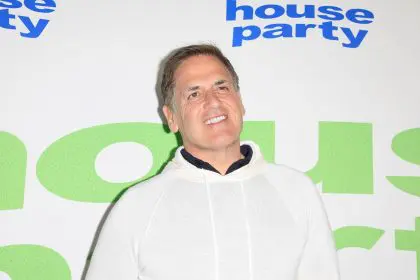Atlantans can rest assured knowing that should they need him, a go-to attorney for intellectual property is readily available close by.
Jonathan D. Goins Esq. has a host of accomplishments; he was dubbed a Georgia Super Lawyer “Rising Star” for Intellectual Property, Entertainment and Sports in 2013 and was noted among the National Bar Association’s top “40 Lawyers Under 40” in 2012.
Prior to that, the Atlanta Business Chronicle dubbed Goins one of the “Top 40 Under 40 Up & Comers” in 2010.
A partner at one of the nation’s largest law firms, Lewis Brisbois, and an adjunct professor on copyright and trademark law at Atlanta’s John Marshall Law School, Goins’ resume speaks to his adroit grasp of intellectual property law.
Versed in all things IP, copyright and trademark, below this eminent attorney dishes on inspiration, his role models and offers his take on success.
Get familiar. –danielle canada
What inspires you to show up at work every day?
I’ve been practicing intellectual property law for over 10 years. I continue to be inspired by my clients, which have included about two dozen Fortune 500 companies; the country’s largest minority-owned construction company; a London-based leading expert on decorative paint; a luxury handbag designer; a reputable sports agency and NBA agent to well-known players with the Miami Heat; the world’s largest summer entertainment festival; two New York-based advertising agencies; a Donald Trump “Apprentice” finalist; an All-Pro defensive tackle for the New England Patriots; record label managers; hip-hop artists; film and TV producers; and media commentators featured on CNN, ESPN, FOX, HLN, the “TODAY” show and “Dr. Oz.
How did you determine your career path?
My parents are both retiring in 2014 — dad has served as an ordained minister with the United Methodist Church; mom has been in the education sector (both as a middle school principal for 13 years and college professor thereafter). I always thought it made sense to combine their skill sets, as the law requires some level of preaching and teaching. My older brother is a police officer; sergeant and former head of security detail for the mayor of Louisville. So providing some form of service is in the family DNA, mine happens to be intellectual property law.
What other industries connect to your career choice?
Name an industry, and it is relevant to what I do. Intellectual property (“IP”) involves developing or protecting one’s trademark, right of publicity, copyright, patent or trade secret. IP is the “bread and butter” of a company’s assets. When we associate a certain quality, brand value or reputation with the name of a company, celebrity or product – that’s IP at work.
“Rolling out,” for instance, is a trademark. So I have helped to create, use or protect IP for clients in a wide variety of industries ranging from technology to advertising, entertainment, sports, fashion apparel, insurance, medicine and construction. I even represented a bank in securing a record label’s songs as copyright collateral should it default on the loan. So no doubt, IP connects to every single industry. Specific to entertainment and sports, I’ve worked for high-profile talent and production management agencies, sports agencies, sports agents, professional athletes, TV producers, entertainers, best-selling authors, and major corporations involved in multi-million dollar advertising for major sporting events. The IP issues vary from negotiating endorsement deals and licensing of distribution content (including digital new media) to resolving disputes in court involving royalties, copyright “works made for hire” agreements, non-competes and confidential non-disclosures, and infringement.
Describe the skill sets that are essential to future business leaders and innovators.
Future business leaders and innovators all have a few skills in common — an unapologetic vision, and a disciplined execution of that vision. Leaders and innovators also have a “sponsor” (not to be confused with a mentor). So vision, execution and some level of help along the way are essential.
Describe innovative methods you apply to your business and life.
Communication – any how, any way, any day. I make phone calls to prospective clients to and from the office. I think it is imperative for any successful lawyer to be available. Technology permits this, even if to an inconvenience. So there isn’t any time I’m hardly unavailable via phone, in person or email.
How do you set goals and evaluate your success?
As a lawyer, success is often evaluated on “repeat business” from existing clients. If I do something well for a client, and he or she comes back to me to handle something else? That’s a win win.
On a more personal note, when I was younger I thought if I had a prestigious job, a steady paycheck, a nice ride with an estate then I had achieved the American dream; that success was complete. But since having a daughter, she’s now 4, I realized the key to life– being thankful and appreciative for the ordinary moments. Sometimes ordinary is extraordinary. As my hometown hero Muhammad Ali once said, “service to others is the rent you pay for room here on earth.” So I hope that my “service” here leaves more “room” for my daughter to have a richer and brighter life than mine. Leaving the next generation better that yours – that’s the ultimate measure of success.
Who do you consider peers in your field? Who is setting a great example of best practices?
Success includes offering something that no one else does. I hardly run into others who look like me in the IP field, although improvement has been made with the help of “think tanks” such as Howard Law’s Institute for Intellectual Property & Social Justice, which was started by Professor Lateef Mtima over ten years ago. Without question there is an under-representation of minority attorneys (let alone who practice IP). And with many larger firms having established longstanding ties to institutional corporate clients, I needed to set myself apart in order to develop my own book of business. I noticed there was not any “go-to” IP attorney for new media, entertainment and sports. The use and technology of the Internet was on the rise, many corporations were looking to expand advertising into digital new media, and artists and players were becoming more attuned to brand recognition and value of ownership. So I started cross-marketing my IP practice to this industry several years ago as it undercuts so many different issues. I’ve learned that those who set a great example are those who are innovative and develop a niche expertise.
How do you stay abreast of changes in your field?
I write and lecture on intellectual property, including serving as an adjunct professor on copyright and trademark law at Atlanta’s John Marshall Law School. So sometimes my students are forcing me to stay abreast. The rapid proliferation of technology and the Internet are constantly changing, and will continue to reshape IP issues in new media and entertainment.
What role does technology play in your daily life?
I don’t think there’s a day that goes by without our using technology in today’s world. I find out about the news thru my phone before my tv. I’m plugged in to my mobile apps, including LinkedIn, American Bar Association Journal, Washington Post, CNN, NBC News and New York Times.
Name your favorite role models for success in two industries.
I learned a lot about how to be a lawyer from my mentor, the Honorable Inez Smith Reid of the District of Columbia Court of Appeals, who graduated from Yale Law in 1962. She was one of only two African-American law students in her class; the other being her twin brother, George Bundy Smith, who went on to become a New York Court of Appeals judge. I clerked for Judge Reid after graduating from Howard Law in 2002. She taught me quite a bit – be detailed and thorough no matter how major or trivial the task (seeing red ink from her on my writings was quite routine).
It is hard not to admire some of my clients, including Valorie Burton, who is a leading life coach and motivational speaker. She has made several appearances with major television networks, including formerly co-hosting The Potter’s Touch with Bishop T.D. Jakes which aired on BET. She has authored nine books and has been a frequent contributor to Oprah Magazine, BlackAmericaWeb.com and Essence. Valorie is a star in her field, and you’ll see more of her as time goes on.
Names three books that changed how you saw life that you would recommend to others.
1.) 48 Laws of Power by Robert Greene 2.) Emancipation by J. Clay Smith and 3. Sun Tzu’s Art of War
Explain why lifelong learning is important to you.
My grandmother passed away earlier this year at the age of 97. It was a gentle reminder that life is short, so live it long. Never get too comfortable. Adapt with change. Embrace new experiences. I go to work trying to remember that I have a “license” and not an absolute right to practice law, so I try not to take that privilege of what I do in life for granted.
Describe the voice of success that you hear in your head.
Keep pushing, for we are his workmanship created for good works.
Community success based on what you do in the community means what to you?
Charles Hamilton Houston, the first Dean of Howard Law, once said “a lawyer is either a social engineer or a parasite to society.” I’ve volunteered in the community thru religious, local and civic organizations since as far back as I can remember, from serving as president of my college chapter of Kappa Alpha Psi to co-founding the Atlanta chapter of Lawyers for Obama. I’ve spent countless free hours of “social engineering” work over the years with groups such as the Pro Bono Partnership of Atlanta and the Georgia Lawyers for the Arts. I currently chair the scholarship committee of a local bar association, which provides up to $15,000 annually in scholarships to law students in financial need.
How do music and cultural events define your self-identity?
Music is food for the soul. I enjoy listening to old school hip hop, reggae, jazz and Gospel. One of my clients is the Milwaukee World Festival, which puts on the world’s largest summer entertainment festival every year. I’m a huge fan of musicians, having played the piano and drums growing up, so it is personally satisfying when I get to work on legal issues involving entertainment. Music is all about who owns the copyrights, so it is no surprise when we see lawsuits alleging imitation of songs such as Robin Thicke’s Blurred Lines.
Describe your favorite vacation spot.
Rio de Janiero; no description needed.
If you could change one thing about yourself, what would you change?
Too impatient.











